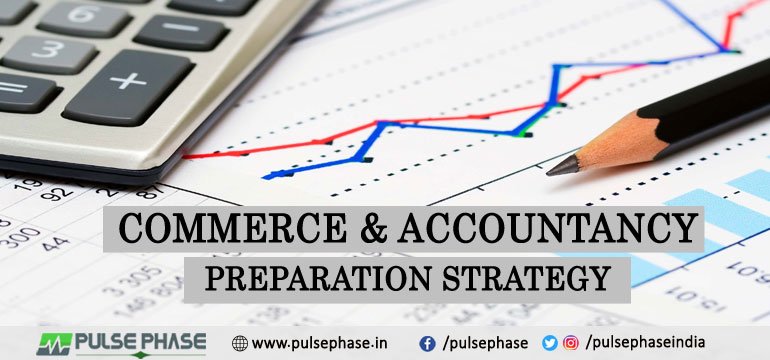Why Choose Commerce and Accountancy as optional subject in UPSC Exams:
Commerce and accountancy is an optional subject that ensures a brilliant score if prepared logically using the best preparation strategies ever. Commerce is a lengthy subject with a somewhat fixed syllabus and just needs enough time to get all the course content revised within and before the exam time. Apart from being a marks scoring subject, the biggest hallmark of opting commerce is that it requires vast study meshing various different outclass sources of knowledge to cover up the entire course in a comprehensive way. To master Preparation Strategy for UPSC Exam commerce and accountancy proper coaching has proved a savior in the scarcity of study material. Students with an accountancy background are best fit to choose commerce as an optional subject making them score 150 marks from the numerical portion.
How to Prepare for UPSC Commerce & Accountancy Optional Subject
Being a technical subject with logical knowledge it is suggested for those students who already have studied it in their earlier educational years. Although it is one of the subjects with extensive course content, fortunately, can make you score full marks in the numerical portion. Continuous practice and deep knowledge are the key factors to succeed in it. Also, some of the most important concepts which you’ve learned in graduation give a great benefit here in the Preparation Strategy for UPSC Exam.
Tips to design preparation strategies for Commerce & Accountancy
- Highlight the Civil Services (UPSC) Exam Course Content
- Pick up well-known books for referral
- Pen down a Study Plan
- Get your own notes prepared
- Solve Past Papers
- Attempt a few Mock tests
Strategy for Preparation
One must keep these six points given below in mind while preparing for their exam:
#1. For Basic Preparation
One should start with a general reading and cultivate an enhanced theoretical clarity with consequent reading directing towards vital description by thinkers and authors, creating clear links with various topics or chapters.
#2. Make Notes
Making notes is exceptionally important in which all diagrams, definitions, examples and core points should be recorded out without ample details. Likewise, all the topics from several sources should be combined into one place. For numerical, working notes should be all kept at one place before or after the main answer.
#3. For Lengthy Answers
When writing long answers, the introduction can be tracked by some lines in an indirect or direct way with a universal description followed by a particular description.
#4. Draw Diagrams
Drawing diagrams can help secure more marks in paper II. So try to use diagrams wherever needed.
#5. Use of Simple and Easy Language
Ensure that you write your answer in a simple and easy language however uphold the essence and do not depart from the question.
#6. Ending Point
Ending point of the answers must be on an optimistic/unrealistic note and also give a suitable solution with examples.
#7. PYQ’s
Examine the past year’s questions for thorough clarity. Solving past years’ questions is a great way to understand the pattern of questions. Solving past year’s questions is really helpful for the Strategy UPSC Exam.
Rely on all the above mentioned sources and strategies.
Commerce and accountancy is one of the options presented by the UPSC for main exams. It is generally recommended for people who have had commerce in their graduation or higher levels as undergraduate and professional studies are applied both in paper I & II. A plus point of this subject is that one can score good marks in numerical problems. Commerce & Accountancy as an optional is very technical in nature and therefore an adequate number of applicants are selecting this optional
Commerce and Accountancy is an elective where you can mark brightly if you apply properly. With the right preparation tactics mentioned above and good answer writing practice, you should be able to get good marks in the two optional papers.
Read More:- Philosophy Preparation Strategies For UPSC Exam




